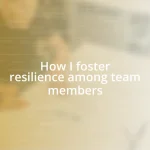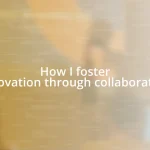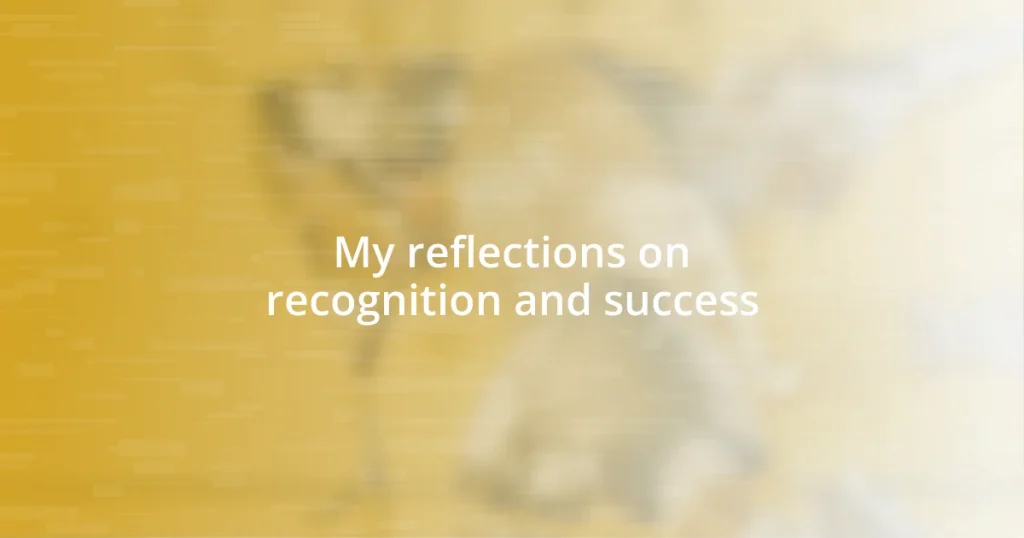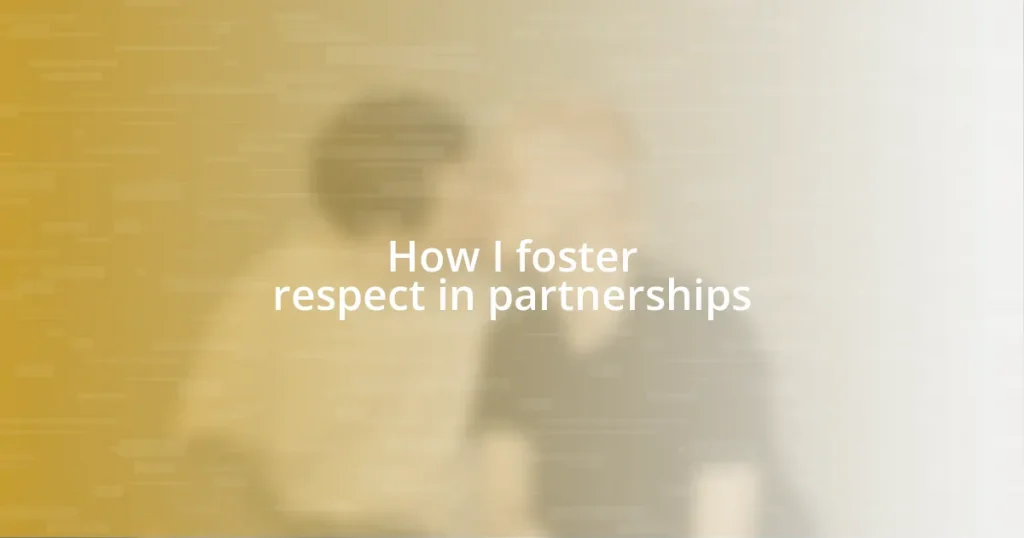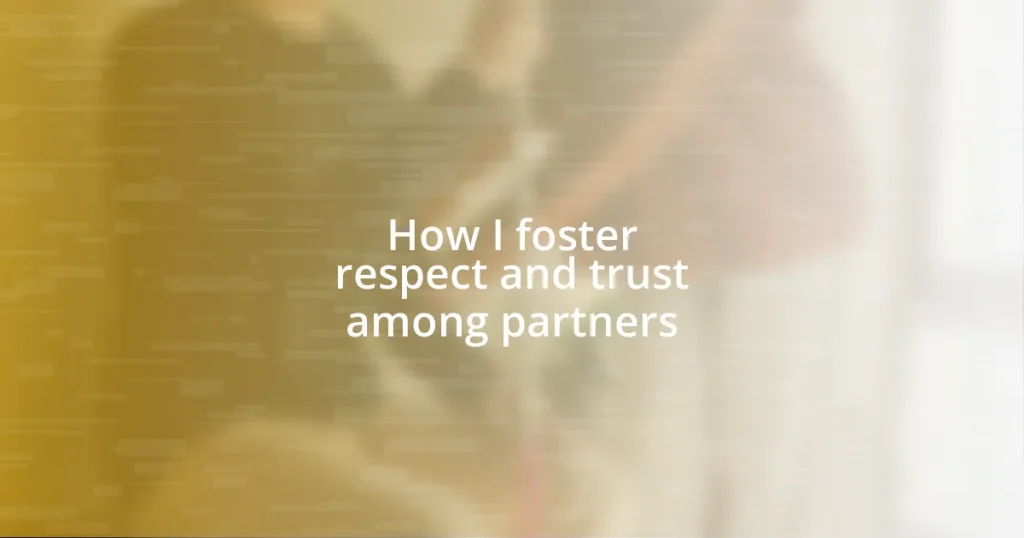Key takeaways:
- Recognition boosts motivation and should align with personal values for meaningful impact.
- Self-reflection is vital for understanding motivations, fostering gratitude, and informing decision-making.
- Celebrating small wins and learning from setbacks strengthens teamwork and sustains motivation for future success.
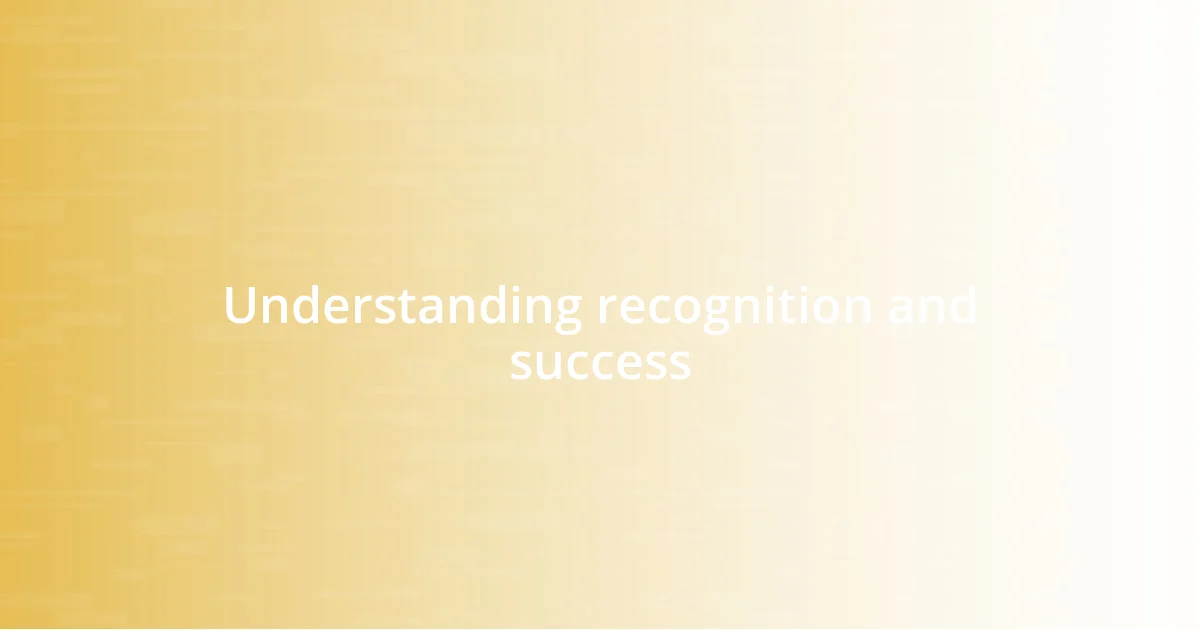
Understanding recognition and success
When I think about recognition and success, I often reflect on moments when my hard work was acknowledged. Do you remember the first time someone praised you for your efforts? That feeling of being seen can spark a motivation that propels you further. I’ve experienced this firsthand; a simple ‘thank you’ from a mentor made me realize just how impactful recognition can be.
Success, on the other hand, is more than just the accolades we receive. It’s about the journey of growth and learning we embark on. I recall a project that seemed destined for failure—until a team member pointed out a small, but crucial detail that turned everything around. Isn’t it fascinating how sometimes our biggest leaps toward success come from overcoming adversity or receiving help from others?
Ultimately, understanding recognition and success is about appreciating the small victories along the way. I often find myself celebrating not just the end results but the countless steps that lead there. What about you? Do you take time to acknowledge your progress, or do you rush forward, focused solely on the next goal? These reflections can create a deeper appreciation for where we’ve been and where we’re going.
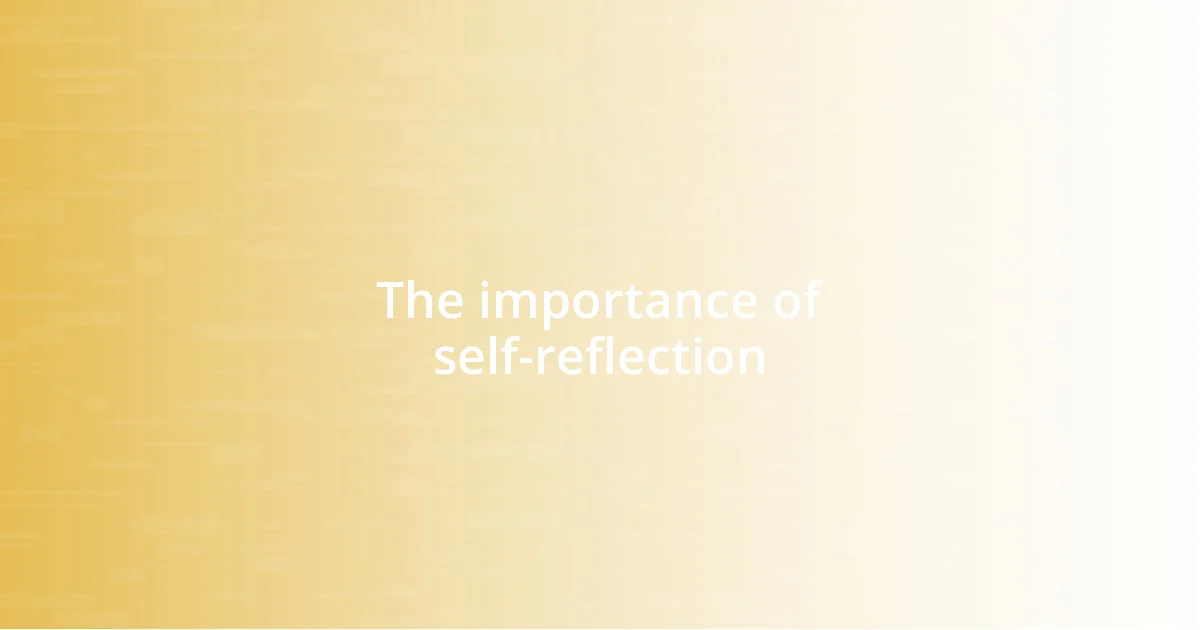
The importance of self-reflection
Self-reflection plays a pivotal role in understanding our motivations and ambitions. I remember when I took a weekend to journal about my experiences after a major career shift. That process helped me uncover not just what I wanted to achieve, but also why I sought those goals in the first place. Have you ever done something similar? It can be incredibly liberating to articulate your thoughts and dreams.
Engaging in self-reflection can also help identify patterns in our behavior. After evaluating my past project successes and failures, I realized that I often underestimated the importance of collaboration. This insight prompted me to intentionally seek feedback from colleagues before moving forward. It’s amazing how understanding ourselves better can lead to more strategic decision-making.
Furthermore, self-reflection fosters a sense of gratitude and appreciation for the journey. I often find myself looking back at my career path and feeling thankful for the lessons learned, especially during challenging times. Embracing these reflections not only makes the victories sweeter but also helps mitigate the sting of setbacks. So, how do you view your experiences? Are they stepping stones toward growth or obstacles along the way?
| Aspect | Self-Reflection |
|---|---|
| Purpose | Understanding personal motivations |
| Outcome | Informed decision-making |
| Emotional Insight | Fostering gratitude |
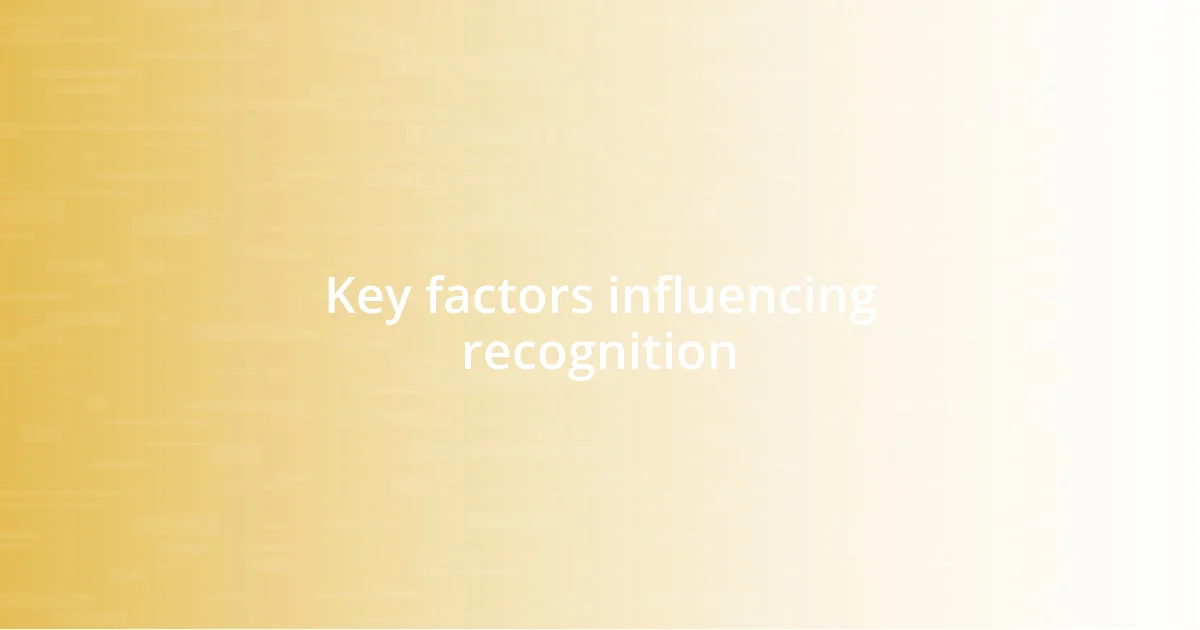
Key factors influencing recognition
Recognition in any setting is often influenced by several key factors that shape how accomplishments are acknowledged. From my own experience, one significant factor is the culture of appreciation within a team or organization. I once worked at a company where every small win was celebrated with shout-outs during weekly meetings. This environment made everyone feel valued and motivated to contribute, reinforcing the idea that recognition truly matters.
Here are some key influences on recognition:
- Organizational Culture: A supportive atmosphere enhances acknowledgment.
- Visibility of Accomplishments: Progress must be seen to be recognized; sharing milestones is crucial.
- Leadership Support: When leaders actively recognize efforts, it sets a powerful example for the entire team.
- Peer Recognition: Often, praise from colleagues resonates more deeply than that from higher-ups.
Another factor that I believe plays an essential role is the alignment of recognition with personal values. In a previous job, I once received an award that didn’t resonate with what I deemed important. Although the acknowledgment came with prestige, I didn’t feel a connection to it. This experience taught me that for recognition to be effective, it must align with the personal motivations and aspirations of the individual. When recognition feels authentic and meaningful, it cultivates deeper engagement.
Think about your own experiences: have you ever received recognition that didn’t sit well with your ideals? Moments like those can help you understand what truly matters to you, guiding how you approach your quest for acknowledgment.
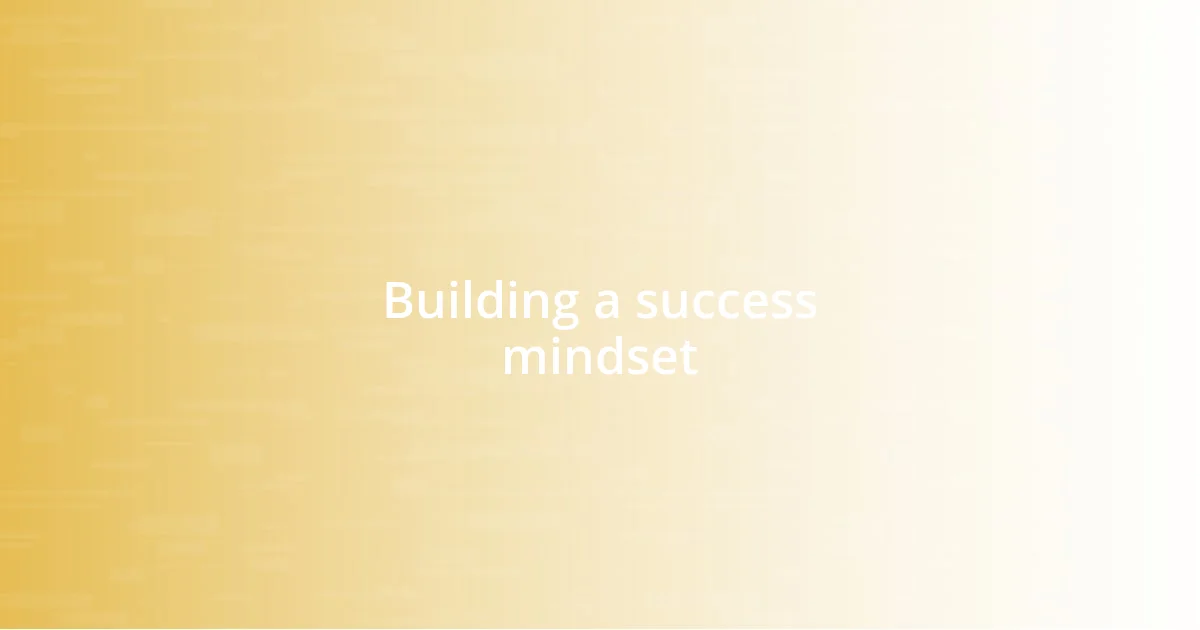
Building a success mindset
Building a success mindset requires a deep understanding of both our goals and the journey toward achieving them. I recall a time when I was fixated on reaching a specific milestone without appreciating the skills I accrued along the way. It hit me one day: success isn’t merely about reaching the destination; it’s about growth. Have you ever paused to recognize all the little wins that lead you forward? Embracing those moments can fuel our motivation and shape our perspective.
Another crucial aspect of cultivating a success mindset is resilience. There were instances in my career where setbacks felt like roadblocks, but I learned to view them as teachers rather than failures. Each challenge offered insights, prompting me to adapt and evolve. How can we shift our mindset during tough times? I found that reframing these experiences as opportunities for learning makes all the difference in staying motivated.
Lastly, surrounding ourselves with positive influences is key in this journey. I’ve often noticed that my outlook brightens significantly when I’m with individuals who uplift and inspire me. Their energy is contagious, and it encourages me to push beyond my comfort zone. Who in your life sparks that drive in you? Cultivating a supportive network helps reinforce our success mindset and promotes a culture of growth rather than stagnation.
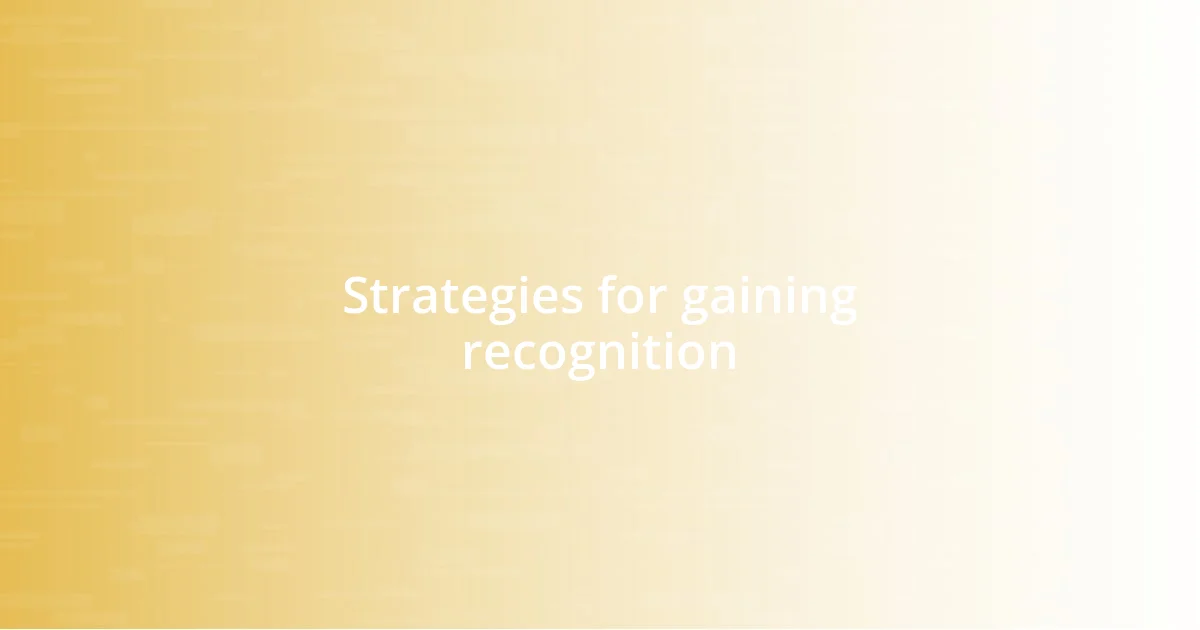
Strategies for gaining recognition
To gain recognition effectively, thinking proactively about how to showcase your accomplishments is essential. I distinctly remember a project where I meticulously documented every milestone. I shared progress updates on a shared platform, which not only highlighted my contributions but also engaged my colleagues. Have you ever considered how sharing your journey can amplify your visibility? It’s something that can make a substantial difference.
Another strategy that resonates with me is building genuine relationships within your team. I once took the time to mentor new employees, which not only fostered camaraderie but also allowed my work and dedication to stand out. There’s something powerful about being known for supporting others—recognition often follows when we actively lift those around us. How do you engage with your colleagues, and is there an opportunity to deepen those connections for mutual recognition?
Lastly, don’t underestimate the power of seeking feedback. Throughout my career, I’ve consistently asked for insights from peers and supervisors to enhance my performance. This practice not only helped me refine my skills but also subtly reinforced my reputation as someone who values growth and collaboration. Have you ever thought about how feedback can lead to greater acknowledgment? It’s a two-way street that creates an environment where recognition flourishes.
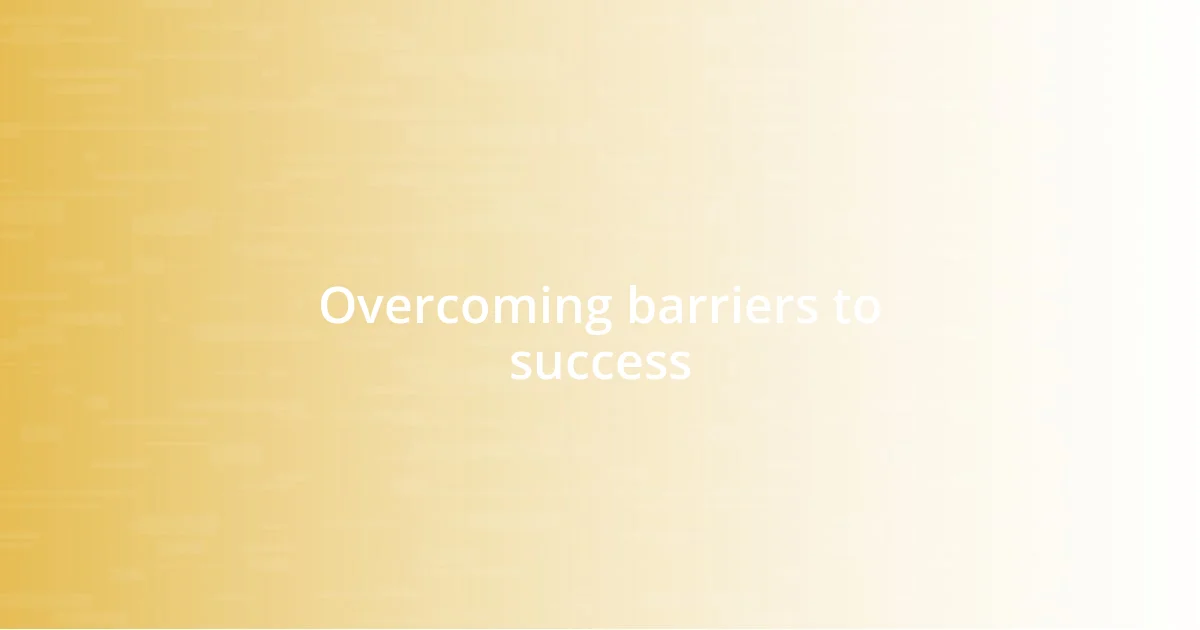
Overcoming barriers to success
Overcoming barriers to success often starts with confronting our inner doubts. I remember a time when I hesitated to pursue a promotion, fearing I wouldn’t live up to expectations. It was a colleague’s encouragement that helped me realize those fears were just stories I told myself. Have you ever let fear hold you back from an opportunity? Addressing these mental blocks can pave the way for incredible growth.
One practical approach I’ve found helpful is embracing small failures as stepping stones. During a significant project, I encountered unexpected challenges that seemed daunting at first. Instead of viewing these moments as setbacks, I began to analyze what went wrong and what I could learn. This shift in perspective not only eased my anxiety but also equipped me with strategies for future endeavors. How often do we allow a single misstep to dictate our overall journey?
Moreover, taking action despite uncertainty can be a powerful catalyst for breaking through barriers. I recall diving into a new role without feeling entirely prepared. Initially, I felt overwhelmed, yet each small victory boosted my confidence. It dawned on me that waiting for the perfect moment often leads to missed opportunities. What if, instead of seeking certainty, we embraced the unknown as a chance to discover our potential? That mindset truly transformed my approach to challenges.
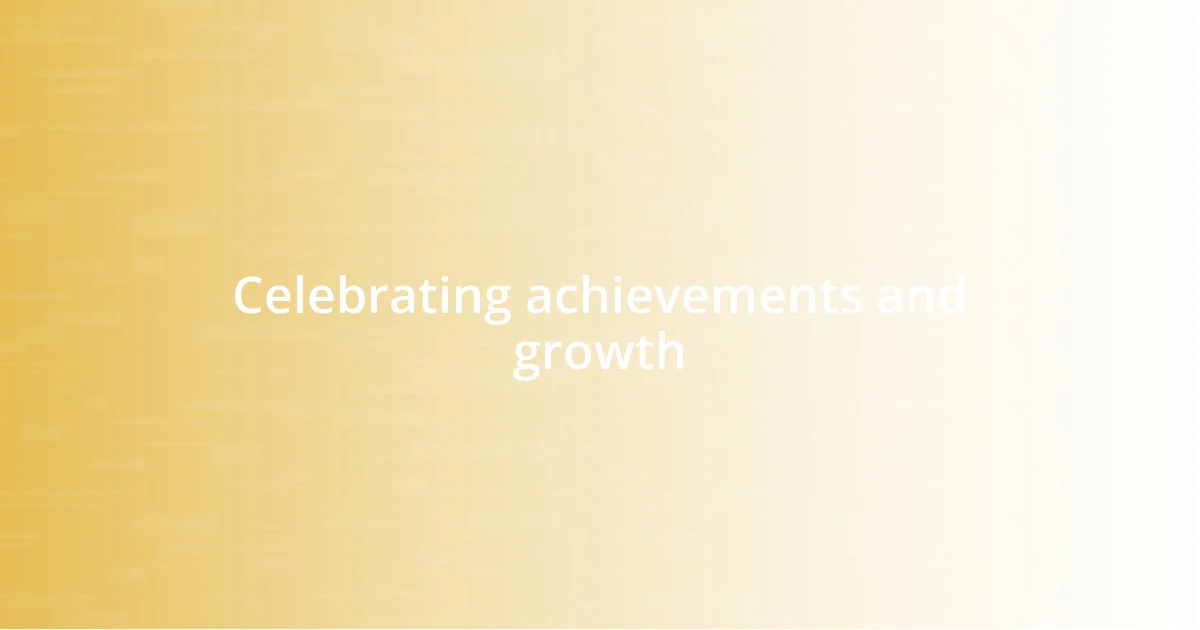
Celebrating achievements and growth
Celebrating achievements is more than just a moment of recognition; it’s a reflection of growth and perseverance. I vividly recall the first time I received a commendation for a project I had poured my heart into. The joy I felt was overwhelming, but what struck me even more was the realization that this acknowledgment was not just about me; it symbolized the collaborative efforts of my team as well. How often do we take a step back and appreciate the collective journey that leads to success?
As I navigated through my career, I learned that celebrating even the smallest wins is crucial for sustained motivation. I remember throwing a small gathering for my colleagues after completing a challenging project. It wasn’t about a grand reward; it was the simple act of recognizing each person’s hard work that strengthened our bonds. Have you ever thought how sharing those moments of joy can create a more supportive environment where everyone feels valued?
In reflecting on my growth, I’ve come to appreciate the importance of acknowledging setbacks along with achievements. There was a time when I felt disheartened after missing a critical deadline. Instead of dwelling on it, I chose to write down what I learned from the experience. This process not only helped me to move forward but also transformed that failure into a stepping stone for greater success. How do you process your challenges, and can you find a way to celebrate the lessons learned from them?




